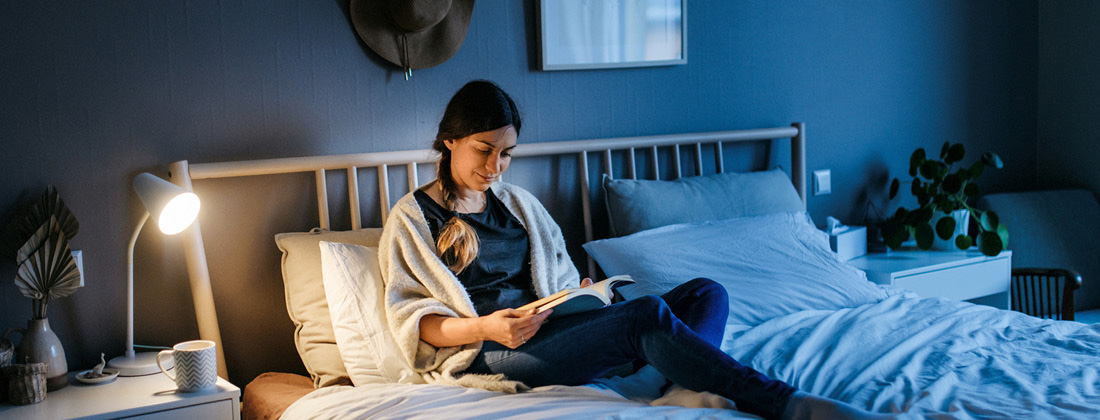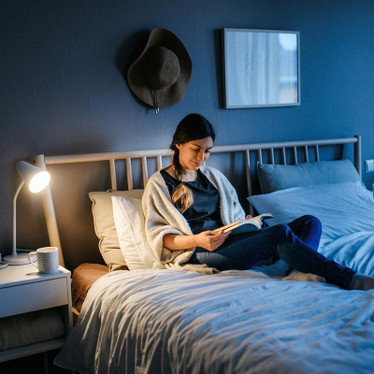
Whether you’re a nighttime waker or have a busy brain at bedtime - here are five holistic tips to help you sleep well. Use these science-based tools to balance your sleep and kick in ‘sleepy hormones’ at night. With these tips you can cultivate sleep habits that suit your unique personality and incorporate them into your bedtime wind-down routine.
For me, it’s keeping track of my caffeine intake and hanging out with my cat (studies show pets lower our wakeful hormones) that make a difference.
Here’s to falling asleep easily and sleeping well through the night.
1. Dark and quiet at bedtime
Our sleep hormone is closely tied to light. Dark and quiet surroundings before bedtime queue its release - making us feel relaxed and drowsy. This helps with sleep onset. Morning sunlight exposure also regulates our sleep cycle - it wakes up your brain for the day and has a flow-on effect to make it easier to sleep at night.
Optimise your sleep cycle:
- Try blackout curtains or an eye mask - to block light from inside and out
- Limit screen time one hour before bed – blue light inhibits our sleep hormone
- Set a blue light filter on your device, the Night Shift setting on IOS or apps like Twilight for Android
- Get sunlight in the morning - open the curtains, step outside or sit on a veranda for a few minutes.
2. 6-hour caffeine cut off
Setting yourself a cut off time for caffeine is an easy way to optimise sleep. Count back six hours from sleep time – it’s the ideal cut off time according to the Journal of Clinical Sleep Medicine. Caffeine can suppress our sleep hormone, making it harder to fall asleep. Caffeine is found in: Coffee, energy drinks, cola drinks, and tea (including green tea.)
Tip: Try incorporating a sleep tonic, herbal tea or hot cacao drink into your wind-down routine along with dimming the lights and creating a quiet atmosphere.
|
3. Foods that help sleep
Getting enough protein gives the body the raw materials to make our natural sleep hormone. Nuts, seeds, legumes, meat and dairy are rich sources of protein. Adults need at least 60 grams of protein per day to stay healthy, more if you’re active or over sixty.
Magnesium is our key sleep mineral. We need sufficient amounts to be able to sleep well – for both sleep onset and duration.
Magnesium rich foods for sleep:
- Nuts – like Brazil nuts, almonds and cashews
- Green leafy veggies - like silverbeet, spinach, dandelion greens and rocket
- Seeds – like chia, sunflower seeds and pumpkin seeds
Avoiding heavy meals before bedtime can also help when it comes to falling asleep.
|
4. Stress buffering for sleep
Drifting off to dreamland is easier if your stress levels are managed. Using proactive ways to buffer stress is one of the most impactful things you can do to look after your sleep. Do you notice sleep is sometimes more of a strugle when you’ve been under extra pressure? That’s because stress triggers alertness (excellent for coping and problem solving but not ideal at sleep time). Stress buffering activities help the body and mind to de-stress. We’re all unique so choose something that suits your personality and lifestyle - if you enjoy it, it’s easier to make it a habit.
3 ways to buffer stress:
- Active relaxation - try an activity that helps you switch off like cooking, exercise, sport or art
- Mindfulness - deep breathing, meditation or time spent in nature
- Journaling or talk therapy - it could be a friend, loved one or a professional
For me, changes in my sleep are often the first sign that I need to up my stress buffering habits – I like to go for a run, spend time in nature or talk to a friend, even better if I can do all three at once!
5. Exercise for deep sleep
Regular exercise has been shown to improve sleep quality, which helps you sleep through the night. Any type of exercise – whether it’s a nature walk or HIIT - whatever suits you, will help. Research shows that moderate intensity is the best exercise for sleep – think walking, dancing, bike riding or pushing a lawn mower. And 30 minutes or more is the ideal duration. Make sure it’s not too close to bedtime.
3 ways exercise benefits sleep:
- Improves sleep maintenance – you wake less during the night
- Improves sleep onset - helps you fall asleep quicker
- Optimises deep restful sleep – you wake up feeling rested and refreshed
Looking for more ways to support restful sleep? Explore our Sleep Support supplements to support healthy production of sleep hormones - for easy, deep sleep.
|

